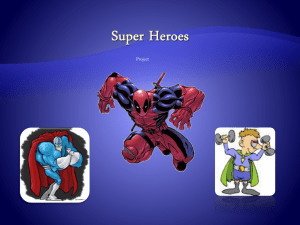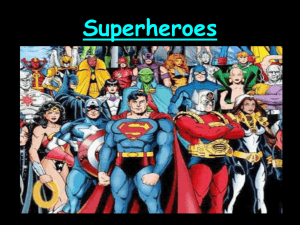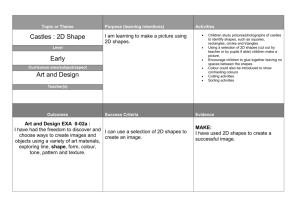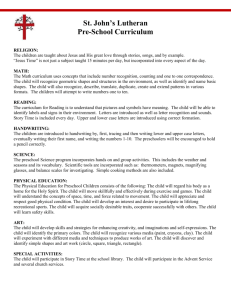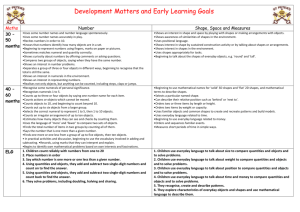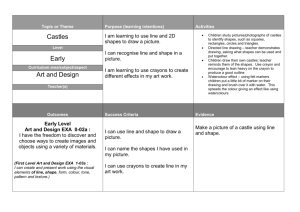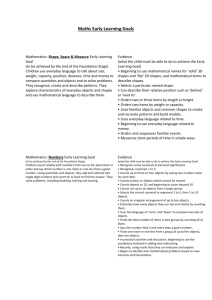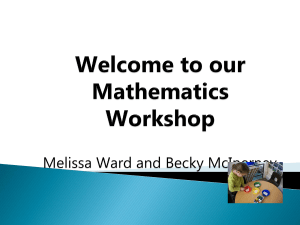Reception Year - Ecton Brook Primary School
advertisement
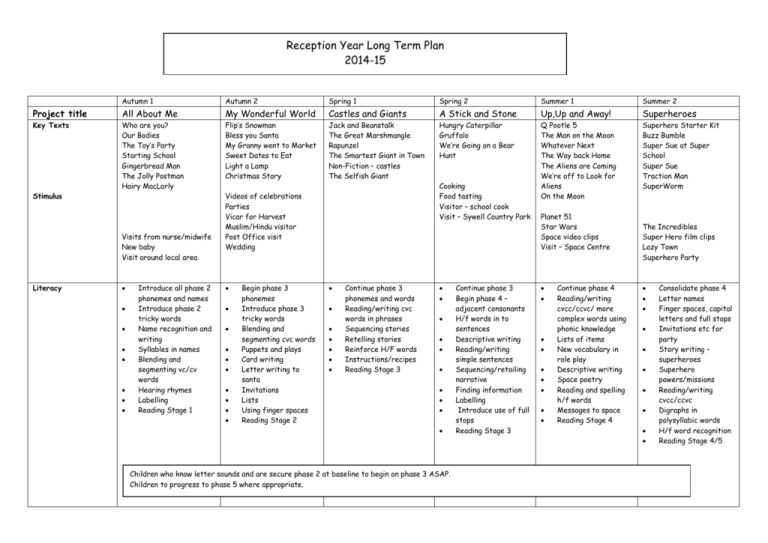
Reception Year Long Term Plan 2014-15 Autumn 1 Autumn 2 Spring 1 Spring 2 Summer 1 Summer 2 Project title All About Me My Wonderful World Castles and Giants A Stick and Stone Up,Up and Away! Superheroes Key Texts Who are you? Our Bodies The Toy’s Party Starting School Gingerbread Man The Jolly Postman Hairy MacLarly Flip’s Snowman Bless you Santa My Granny went to Market Sweet Dates to Eat Light a Lamp Christmas Story Jack and Beanstalk The Great Marshmangle Rapunzel The Smartest Giant in Town Non-Fiction – castles The Selfish Giant Hungry Caterpillar Gruffalo We’re Going on a Bear Hunt Q Pootle 5 The Man on the Moon Whatever Next The Way back Home The Aliens are Coming We’re off to Look for Aliens On the Moon Superhero Starter Kit Buzz Bumble Super Sue at Super School Super Sue Traction Man SuperWorm Stimulus Visits from nurse/midwife New baby Visit around local area Literacy Introduce all phase 2 phonemes and names Introduce phase 2 tricky words Name recognition and writing Syllables in names Blending and segmenting vc/cv words Hearing rhymes Labelling Reading Stage 1 Videos of celebrations Parties Vicar for Harvest Muslim/Hindu visitor Post Office visit Wedding Begin phase 3 phonemes Introduce phase 3 tricky words Blending and segmenting cvc words Puppets and plays Card writing Letter writing to santa Invitations Lists Using finger spaces Reading Stage 2 Continue phase 3 phonemes and words Reading/writing cvc words in phrases Sequencing stories Retelling stories Reinforce H/F words Instructions/recipes Reading Stage 3 Cooking Food tasting Visitor – school cook Visit – Sywell Country Park Children who know letter sounds and are secure phase 2 at baseline to begin on phase 3 ASAP. Children to progress to phase 5 where appropriate. Continue phase 3 Begin phase 4 – adjacent consonants H/f words in to sentences Descriptive writing Reading/writing simple sentences Sequencing/retailing narrative Finding information Labelling Introduce use of full stops Reading Stage 3 Planet 51 Star Wars Space video clips Visit – Space Centre Continue phase 4 Reading/writing cvcc/ccvc/ more complex words using phonic knowledge Lists of items New vocabulary in role play Descriptive writing Space poetry Reading and spelling h/f words Messages to space Reading Stage 4 The Incredibles Super Hero film clips Lazy Town Superhero Party Consolidate phase 4 Letter names Finger spaces, capital letters and full stops Invitations etc for party Story writing – superheroes Superhero powers/missions Reading/writing cvcc/ccvc Digraphs in polysyllabic words H/f word recognition Reading Stage 4/5 Maths Uses some number names and number language spontaneously. Uses some number names accurately in play. Recites numbers in order to 10. Recognise some numerals of personal significance. Recognises numerals 1 to 5. Counts up to three or four objects by saying one number name for each item. Realises not only objects, but anything can be counted, including steps, claps or jumps. Shows an interest in shape and space by playing with shapes or making arrangements with objects. Shows interest in shapes in the environment. Knows that numbers identify how many objects are in a set. Beginning to represent numbers using fingers, marks on paper or pictures. Sometimes matches numeral and quantity correctly. Compares two groups of objects, saying when they have the same number. Shows an interest in number problems. Shows an interest in representing numbers. Counts actions or objects which cannot be moved. Counts objects to 10, and beginning to count beyond 10. Counts out up to six objects from a larger group. Counts an irregular arrangement of up to ten objects. Shows awareness of similarities of shapes in the environment. Uses positional language. Shows interest in shape by sustained construction activity or by talking about shapes or arrangements. Can describe their relative position such as ‘behind’ or ‘next to’. Separates a group of three or four objects in different ways, beginning to recognise that the total is still the same. Selects the correct numeral to represent 1 to 5, then 1 to 10 objects. Finds the total number of items in two groups by counting all of them. Says the number that is one more than a given number. Finds one more or one less from a group of up to five objects, then ten objects. Records, using marks that they can interpret and explain. Uses shapes appropriately for tasks. Beginning to talk about the shapes of everyday objects, e.g. ‘round’ and ‘tall Beginning to use mathematical names for ‘solid’ 3D shapes and ‘flat’ 2D shapes, and mathematical terms to describe shapes. Orders two or three items by length or height. Orders two items by weight or capacity Orders and sequences familiar events. Children use everyday language to talk about Estimates how many objects they can see and checks by counting them. Uses the language of ‘more’ and ‘fewer’ to compare two sets of objects. In practical activities and discussion, beginning to use the vocabulary involved in adding and subtracting. Children count reliably with numbers from one to 20. Place numbers in order. Uses everyday language related to time. Beginning to use everyday language related to money. Measures short periods of time in simple ways. Begins to identify own mathematical problems based on own interests and fascinations Say which number is one more or one less than a given number. Children use everyday language to talk about time and capacity to compare quantities and objects and to solve problems. Children use everyday language to talk about money to compare quantities and objects and to solve problems. They begin to solve problems, including doubling, halving and sharing. Using quantities and objects, they add and subtract two single-digit numbers and count on or back to find the answer. They solve problems, including doubling, halving and sharing. Children use everyday language to talk about distance and capacity to compare quantities and objects and to solve problems. They explore characteristics of everyday objects and shapes and use mathematical language to describe them. Uses familiar objects and common shapes to create and recreate patterns and build models. Problem Solving Who is the tallest? Does the tallest person have biggest shoes? Teddies and candles for cakes UW Computing Switched on Computing Senses Caring for self and others Pets/animals Babies/growing up Keeping healthy Address and local area Buildings in local area Family tree Complete a program Wrapping parcels Weighing parcels and working out simple costs Activities 1/2/9 We have confidence We can take turns x 2 We can listen Investigation Cooking – changes in state PSED Leaving carer Belonging Making new friends New experiences Lunchtimes Divali/eid/Christmas/ hannukah Guy Fawkes Harvest Halloween Countries around the world World food Typing first name Seasons Animals Shape and pattern problems – how many shapes do we need to fill a space/build a wall Activities 4/6/10/14 We can mail We can understand instructions We are DJs We have feelings Making own flying carpets/aeroplanes – which materials are best? Sharing Giving and receiving gifts Differences in cultures and beliefs size to compare quantities and objects and to solve problems. Children use everyday language to talk about weight to compare quantities and objects and to solve problems. Children use everyday language to talk about capacity to compare quantities and objects and to solve problems. Castles Protective clothing Grow and record beans Easter story Programmable toys Draw picture and print Chinese new year /pancake day Sorting foods for snack Planning for Mr Grinling’s lunches How can we stop the seagulls eating sandwiches? Favourite foods/data handling Activities 12/13/23/24 We are digital readers We are talkers We are film producers We can record soundtracks Which is the best material to build a castle? Sharing/taking turns Working as a group Likes and dislikes Independence Healthy foods Tasting Cooking Growing foods Origins of food Changes – environment/science Seasons Minibeasts Typing full name Delete key Which rocket balloons fly the furthest? Paper aeroplane balloons – how far do they fly? Understanding similarities and differences Independence Consequences of Activities 8/15/18/20 We can blog We can observe We are healthy We are community members Which are favourite foods? Likes and dislikes? Shadows Planets Similarities/differen ces/preferences – different places Using a range of programs independently Who is quickest? How many jumps/skips can we do in a minute? Activities 5/11/16/17 We can understand messages We are designers We can count We can drive Rocket Balloons Independence in choosing activities and resources Negotiating in conflict situations People who help us as heroes Parachutes and toys Design and make a costume with cape and hat band Caring for environment Type full name independently Cooking each week Activities 7/8/18/21 We are shape makers We can exercise We are healthy We are games players Which materials make the best parachute/cape? Poster of Superheroes Superhero dos and don’ts lists (book) Introduce themselves PD School/classroom rules (Super Sam and Sue) Getting dressed and undressed(PE and coat) Pencil grip Keeping healthy Moving to music Independent toileting Hand washing Using a knife and fork Church visit Parachute games Apparatus introduction Handwriting – straight lines Threading Throwing/catching Writedance/Activate each day Apparatus Ball skills Keeping healthy Handwriting – correct letter formation Writedance/Activate each day Tournament practise actions Working with a partner/group Dancing to range of music Effects of exercise on body Handwriting – correct formation Writedance/Activate each day Asking for help when needed Space dancing Handwriting – correct formation Writedance/Activate each day Space dances Sports day practice Atheltics – running, throwing, jumping EAD Colour recognition Singing familiar songs Painting self portraits Handprints Imagination in role play home corner Role play gym Role play opticians/doctors Large construction Cards/calendars Using imagination Festival songs Recognising and playing simple instruments Role play wedding Role play party house Printing Observational drawings Salt dough/clay Narrative in role play/drama Making different sounds with instruments Role play castle Weaving Costume making Painting from imagination Listening to different types of music Copying patterns and rhythms Make own instruments Role play café/restaurant Natural patterns Pictures with natural materials Role Play space shuttle Designing aliens Designing planets/space transportation Using a range of tools independently Make space role play clothes and props as superhero to the class Moving to Year 1 (story time) Design games and assault courses to rescue toys Athletics – running/throwing/jum ping Writedance/Activate each day Fine motor control Superhero dance – hiding/leaping/flying/ landing/hanging Playdough characters – stretch arms Design a logo Mask making Use imagination to paint/draw a baddie Create superhero name and picture Superhero song (p37 NE) Compose own theme tune Make laser/magic tool Design own certificates/ID cards Life size superhero Enact a rescue – role play Role play superhero den Open Session Trip/Event PSED CD MD KUW CLL PD Teddy Bear’s Picnic Wedding Medieval Banquet Sywell country park Space Centre Superhero Party Big Wow! All About Me Box DfW Granny’s carpet Global Diversity Learn about each others cultures and beliefs Granny went to market – visits to different countries, use web to find out more. Different festivals Come dresses for Medieval Banquet on first day Look at castles around the world. How are they the same? Different? Sywell Trip in first week Caterpillars Foods from around the world Chinese New Year Space Centre Trip in first week Find out about different cultures= on the other side of the world. Dress as Super Hero on first day Superhero costumes for different weathers depending on home country
